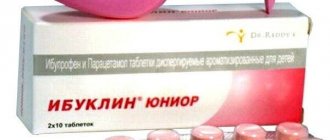A vaccine is a pharmaceutical preparation that contains killed or weakened particles of bacteria and viruses, which allows the body to develop immunity without serious damage to health.
The use of vaccines is justified both for the prevention of the disease and for its treatment (during a protracted course of the disease, when it is necessary to stimulate the immune system).
Preventive vaccinations are used in small and adult patients; their combination and sequence of administration are prescribed in a special document - the National Calendar of Preventive Vaccinations. These are expert recommendations for achieving the best results with minimal negative consequences.
Vaccinations for children according to age. Table 2020
The 2020 vaccination schedule for children (preventive vaccination calendar) in Russia provides for the protection of children and infants up to one year old from the most dangerous diseases. Some vaccinations for children are performed directly in the maternity hospital, others can be done at the district clinic in accordance with the vaccination schedule.
Vaccinations for children under one year old
| Age | Direction of vaccination, stages | Name of certified vaccines | Notes |
| Vaccinations for children under 1 year of age | |||
| The first day after birth | I for viral hepatitis B | Engerix "B", Euvax "B", Regevak "B" | Vaccination is carried out in the maternity hospital |
| 3-7 days after birth | I vaccination against tuberculosis BCG | Tuberculosis vaccine BCG | Tuberculosis vaccine for gentle primary immunization BCG-M |
| 1 month | II from viral hepatitis "B" | Engerix "B", Euvax "B", Regevak "B" | Done no earlier than 30 days after the first dose of the vaccine |
| 2 months | 1 from pneumococcal infection | Pneumo-23, Prevenar | |
| III against viral hepatitis B | Engerix "B", Euvax "B", Regevak "B" | ||
| 3 month | I for whooping cough, diphtheria, tetanus DTP | ADS-anatoxin, ADS-M-anatoxin, Infanrix | Staged vaccination. Done at intervals of 45 days |
| I vaccination against polio | Infanrix Hexa, Pentaxim | Can be taken simultaneously with DTP vaccine | |
| I against Haemophilus influenzae | Act-Hib, Hiberix | Used to vaccinate children at risk | |
| 4.5 months | II for whooping cough. diphtheria, tetanus | ADS-anatoxin, ADS-M-anatoxin, Infanrix | 45 days after the previous vaccination |
| II polio vaccine | Infanrix Hexa, Pentaxim | Can be taken simultaneously with DTP vaccine | |
| II against Haemophilus influenzae infection | Act-Hib, Hiberix | For children at risk | |
| II for pneumococcal infection | Pneumo-23, Prevenar | ||
| 6 months | III for diphtheria, whooping cough, tetanus | ADS-anatoxin, ADS-M-anatoxin, Infanrix | 45 days after the previous vaccination |
| Additional vaccination against viral hepatitis B | Engerix "B", Euvax "B", Regevak "B" | A child at risk is vaccinated to quickly strengthen immunity to the virus. | |
| III polio vaccine | Infanrix Hexa, Pentaxim | Can be taken simultaneously with DTP vaccine | |
| III against Haemophilus influenzae | Act-Hib, Hiberix | For children at risk | |
| 12 months | I for measles, rubella, mumps | Priorix | |
| IV for viral hepatitis B | Engerix "B", Euvax "B", Regevak "B" |
Vaccinations for newborns in the first 24 hours of life
- First vaccination against viral hepatitis B
The first, second and third vaccinations are carried out according to the 0-1-6 scheme (1 dose - at the start of vaccination, 2 dose - a month after 1 vaccination, 3 dose - 6 months after the start of vaccination), with the exception of children belonging to groups risk, vaccination against viral hepatitis B which is carried out according to the 0-1-2-12 scheme (1 dose - at the start of vaccination, 2 dose - a month after 1 vaccination, 2 dose - 2 months after the start of vaccination, 3 dose - after 12 months from the start of vaccination).
Vaccinations for newborns on days 3-7 of life
- Vaccination against tuberculosis
Vaccination is carried out with a vaccine for the prevention of tuberculosis for gentle primary vaccination (BCG-M); in constituent entities of the Russian Federation with incidence rates exceeding 80 per 100 thousand population, as well as in the presence of tuberculosis patients around the newborn - the vaccine for the prevention of tuberculosis (BCG).
Vaccinations are given at 1 month
- Second vaccination against viral hepatitis B
The first, second and third vaccinations are carried out according to the 0-1-6 scheme (1 dose - at the start of vaccination, 2 dose - a month after 1 vaccination, 3 dose - 6 months after the start of vaccination), with the exception of children belonging to groups risk, vaccination against viral hepatitis B which is carried out according to the 0-1-2-12 scheme (1 dose - at the start of vaccination, 2 dose - a month after 1 vaccination, 2 dose - 2 months after the start of vaccination, 3 dose - after 12 months from the start of vaccination).
Vaccinations are given at 2 months
- Third vaccination against viral hepatitis B (risk group).
Vaccination is carried out for children belonging to risk groups (born from mothers of HBsAg carriers, patients with viral hepatitis B or those who had viral hepatitis B in the third trimester of pregnancy, who do not have test results for markers of hepatitis B, who use narcotic drugs or psychotropic substances, from families in which is a carrier of HBsAg or a patient with acute viral hepatitis B and chronic viral hepatitis).
- First vaccination against pneumococcal infection.
Vaccinations are given at 3 months
- The first vaccination against diphtheria, whooping cough, tetanus.
- First vaccination against polio.
The first and second vaccinations are carried out with a vaccine for the prevention of polio (inactivated).
- First vaccination against hemophilus influenzae infection (risk group).
Vaccination is carried out for children belonging to risk groups (with diseases of the nervous system, immunodeficiency conditions or anatomical defects leading to a sharply increased risk of hemophilus influenzae infection; with intestinal abnormalities; with cancer and/or long-term immunosuppressive therapy; children born to mothers with HIV infection; children with HIV infection; premature and low birth weight children; children in orphanages).
Vaccinations are given at 4.5 months
- Second vaccination against diphtheria, whooping cough, tetanus.
- Second vaccination against hemophilus influenzae infection (risk group).
Vaccination is carried out for children belonging to risk groups (with diseases of the nervous system, immunodeficiency conditions or anatomical defects leading to a sharply increased risk of hemophilus influenzae infection; with intestinal abnormalities; with cancer and/or long-term immunosuppressive therapy; children born to mothers with HIV infection; children with HIV infection; premature and low birth weight children; children in orphanages).
- Second vaccination against polio. The second vaccination is carried out with a vaccine for the prevention of polio (inactivated).
- Second vaccination against pneumococcal infection.
Vaccinations are given at 6 months
- Third vaccination against diphtheria, whooping cough, tetanus
- Third vaccination against viral hepatitis B
The first, second and third vaccinations are carried out according to the 0-1-6 scheme (1 dose - at the start of vaccination, 2 dose - a month after 1 vaccination, 3 dose - 6 months after the start of vaccination), with the exception of children belonging to groups risk, vaccination against viral hepatitis B which is carried out according to the 0-1-2-12 scheme (1 dose - at the start of vaccination, 2 dose - a month after 1 vaccination, 2 dose - 2 months after the start of vaccination, 3 dose - after 12 months from the start of vaccination).
- Third vaccination against polio
The third vaccination and subsequent revaccinations against polio are given to children with the vaccine for the prevention of polio (live); children belonging to risk groups (with diseases of the nervous system, immunodeficiency conditions or anatomical defects leading to a sharply increased risk of contracting hemophilus influenzae infection; with intestinal abnormalities; with cancer and/or receiving long-term immunosuppressive therapy; children born to mothers with HIV -infection; children with HIV infection; premature and low birth weight children; children in orphanages) - vaccine for the prevention of polio (inactivated).
- Third vaccination against Haemophilus influenzae (risk group)
Vaccination is carried out for children belonging to risk groups (with diseases of the nervous system, immunodeficiency conditions or anatomical defects leading to a sharply increased risk of hemophilus influenzae infection; with intestinal abnormalities; with cancer and/or long-term immunosuppressive therapy; children born to mothers with HIV infection; children with HIV infection; premature and low birth weight children; children in orphanages).
Vaccinations are given at 1 year (12 months)
- Vaccination against measles, rubella, mumps
- Fourth vaccination against viral hepatitis B (risk groups)
Vaccination is carried out for children belonging to risk groups (born from mothers of HBsAg carriers, patients with viral hepatitis B or those who had viral hepatitis B in the third trimester of pregnancy, who do not have test results for markers of hepatitis B, who use narcotic drugs or psychotropic substances, from families in which is a carrier of HBsAg or a patient with acute viral hepatitis B and chronic viral hepatitis).
Vaccination table for children under 3 years of age
| Age | Direction of vaccination, stages | Name of certified vaccines | Notes |
| Vaccination schedule for children under 3 years of age | |||
| 15 months | II against pneumococcal infection | Pneumo-23, Prevenar | |
| 18 months | I revaccination against whooping cough, diphtheria, tetanus | ADS-anatoxin, ADS-M-anatoxin, Infanrix | |
| Anti-polio drops | Oral polio vaccine types 1, 2, 3 | Can be taken simultaneously with DTP vaccine | |
| Revaccination against Haemophilus influenzae | Act-Hib, Hiberix | For children at risk | |
| 20 months | Anti-polio drops | Oral polio vaccine types 1, 2, 3 |
Vaccinations are given at 1.3 years (15 months)
- Revaccination against pneumococcal infection
Vaccinations are given at one and a half years (18 months)
- First revaccination against polio
The third vaccination and subsequent revaccinations against polio are given to children with the vaccine for the prevention of polio (live); children belonging to risk groups (with diseases of the nervous system, immunodeficiency conditions or anatomical defects leading to a sharply increased risk of contracting hemophilus influenzae infection; with intestinal abnormalities; with cancer and/or receiving long-term immunosuppressive therapy; children born to mothers with HIV -infection; children with HIV infection; premature and low birth weight children; children in orphanages) - vaccine for the prevention of polio (inactivated).
- First revaccination against diphtheria, whooping cough, tetanus
- Revaccination against Haemophilus influenzae infection (risk groups)
Vaccinations are given at 1 year 8 months (20 months)
- Second revaccination against polio
The third vaccination and subsequent revaccinations against polio are given to children with the vaccine for the prevention of polio (live); children belonging to risk groups (with diseases of the nervous system, immunodeficiency conditions or anatomical defects leading to a sharply increased risk of contracting hemophilus influenzae infection; with intestinal abnormalities; with cancer and/or receiving long-term immunosuppressive therapy; children born to mothers with HIV -infection; children with HIV infection; premature and low birth weight children; children in orphanages) - vaccine for the prevention of polio (inactivated).
Vaccination table for children over 3 years old
| Age | Direction of vaccination, stages | Name of certified vaccines | Notes |
| After 3 years | |||
| 6 years | Revaccination against measles, rubella, mumps | Priorix | |
| 7 years | Revaccination against tuberculosis BCG | Tuberculosis vaccine BCG | |
| Stage II of revaccination against whooping cough, diphtheria and tetanus | ADS-anatoxin, ADS-M-anatoxin, Infanrix | ||
| 13 years | Vaccination against rubella | Cultured live rubella vaccine | |
| Vaccination against viral hepatitis B | Engerix "B", Euvax "B", Regevak "B" | It is given to children who have not been vaccinated previously | |
| 14 years | III revaccination of whooping cough, diphtheria, tetanus | ADS-anatoxin, ADS-M-anatoxin, Infanrix | |
| Repeated BCG revaccination | Tuberculosis vaccine BCG | ||
| III revaccination against polio | Oral polio vaccine types 1, 2, 3 | ||
Vaccination table for adults
| Age | Graft |
| 18 years and older | Revaccination against diphtheria, tetanus - every 10 years from the date of the last revaccination. |
Vaccinations are given to adults
Diphtheria, tetanus
Vaccination is carried out for adults aged 18 years and older - every 10 years from the date of the last revaccination.
Viral hepatitis B
Vaccination is carried out for adults from 18 to 55 years of age who have not been vaccinated previously.
Rubella
Vaccination is carried out for women from 18 to 25 years of age (inclusive), who have not been sick, have not been vaccinated, have been vaccinated once against rubella, and have no information about vaccinations against rubella.
Measles
Vaccination is carried out for adults from 36 to 55 years (inclusive), belonging to risk groups (employees of medical and educational organizations, trade, transport, public utilities and social spheres; persons working on a rotational basis and employees of state control bodies at checkpoints across the state border of the Russian Federation Federation), have not been sick, have not been vaccinated, have been vaccinated once, and have no information about vaccinations against measles.
Flu shot
Vaccination against influenza is carried out for adults working in certain professions and positions (workers of medical and educational organizations, transport, public utilities); pregnant women; adults over 60 years old; persons subject to conscription for military service; people with chronic diseases, including lung disease, cardiovascular disease, metabolic disorders and obesity.
List of basic vaccinations for infants
Until one year of age, children, in the absence of contraindications, receive vaccinations according to the calendar:
- against tuberculosis;
- 3 vaccinations each against hepatitis B, polio, as well as diphtheria, whooping cough, tetanus;
- vaccination against measles, rubella and mumps;
- 2 against pneumococcal infection;
- if there is a risk - 4th against hepatitis B and 3 vaccinations against Hib.
For each administration of an immune drug, the vaccination calendar for children from birth sets a certain age, by month.
For hepatitis B
Hepatitis B (HBV) is a dangerous viral infection that destroys the liver and contributes to the development of cirrhosis and cancer. The virus is transmitted through blood:
- at a dentist appointment;
- when using a toothbrush or scissors shared with the patient;
- with blood transfusions;
- when children accidentally manipulated used syringes discarded by drug addicts who had HBV;
- sexually.
The virus lives in the external environment for months. It is not yet possible to be cured - there are no drugs that reliably improve the prognosis of hepatitis B. The only salvation is timely vaccination.
By the end of the 20th century, the first vaccines appeared that could protect against hepatitis with a probability of more than 95%. Immunization against HBV according to the calendar reduced the incidence by 30 times.
In children under one year of age, to develop immunity to HBV, according to the calendar, a minimum of 3 vaccinations are needed: the 1st - on the 1st day of life or on any subsequent day, if there were contraindications at birth, the next vaccination - after 1 month and another one - after 5 months.
Between the 1st and 2nd administration, the break according to the calendar should not be more than 5 months, or the course must be started again. Otherwise, immunization is ineffective.
The presented algorithm for the calendar up to a year is generally accepted. But accelerated, emergency schemes are also known. They are usually used in adults who have not previously received a hepatitis vaccine.
Adverse events after vaccination against HBV occur in approximately 1 in 10 children under one year of age: pain, redness at the injection site. In 1% of cases there is a low-grade fever. Allergic rashes occur. Dangerous reactions such as anaphylactic shock and angioedema are recorded in one out of 600 thousand people.
If a child is a carrier of HBV or is already sick with it, the vaccine is not given. Premature babies are not immunized - vaccination is postponed. But jaundice in newborns is not considered a contraindication for the administration of the HBV vaccine according to the calendar.
5 ml of the drug is administered intramuscularly, for children under one year of age, more often in the thigh, for adults in the shoulder, so as not to accidentally get into the subcutaneous fat layer, which is fraught with complications.
1-2 months after vaccination, an analysis of the number of antibodies produced to the virus will show how effective it is. Antibodies should be more than 10 IU/ml. Immunity becomes stable approximately 2 weeks after the 3rd vaccination. If the 2nd administration was postponed, then the 3rd is still needed no later than 6 months after the 1st, taking into account the vaccination calendar for up to a year. If more time has passed, they are tested for the titer of antibodies to HBV. When the titer is low, the cycle begins again.
There are different types of vaccines against hepatitis B, but each of them contains HBV proteins (antigens) (HBsAg). In each dose, this active component is present in an amount of 10 mcg (95% of the drug weight). There are no live viruses in it, so it is impossible to get even a mild degree of hepatitis B after vaccination.
In Russia, for vaccinations according to the calendar for newborns, the drugs presented in the table are used:
| Vaccines | Company manufacturer | Country of Origin |
| Engerix-V | GlaxoSmithKline | England |
| Sci-B-Vac | VBI Vaccines Inc. | Israel |
| H-B-VAX II | Merck & Co., Inc. | USA |
| Regevak B | Binnopharm | RF |
| Eberbiovak NV | Heber Biotec | Republic of Cuba |
The vaccine contains an adjuvant – aluminum hydroxide (hydroxide). It ensures an enhanced response of the immune system and a uniform release of antigens into the blood. Preservatives and baker's yeast are also present. Hypoallergenic imported preparations do not contain yeast, therefore they are more expensive than domestic ones.
For tuberculosis
Tuberculosis is a dangerous infection that can affect children almost immediately after birth. In addition to pulmonary tuberculosis, there is tuberculosis of the skin, bones, lymph nodes, mucous membranes, genital and urinary tracts, and other internal organs.
The earlier BCG is administered (usually 3-7 days of life), the more effective it is.
BCG (BCG) stands for Bacillus Calmette-Guerin - “Calmette-Guerin bacillus”. It contains live weakened tuberculous mycobacteria of the BCG-1 strain, which cause the formation of immunity to tuberculosis for up to 10 years over the course of about a year.
The composition of the BCG vaccine has remained virtually unchanged since 1921.
A single dose includes a different number of dead and live bacilli, which depends on their subtype and the method of preparation.
The vaccination is effective if a scar forms on the shoulder a year after it. If it is hardly noticeable, immunization is insufficient.
Taking into account the calendar, the BCG vaccine is administered in the form of a suspension intradermally into the outer surface of the left shoulder, at the border of the upper and middle third. Do not lubricate this area with antiseptics. If vaccination in the shoulder is contraindicated, it is injected into the thigh.
Vaccination rules according to the national calendar
When making a decision about vaccination, it is important to keep in mind the legal norms adopted in the Russian Federation:
- Vaccination is a voluntary choice of parents. There is no penalty for refusing it, but it is worth considering what such a decision entails for the well-being of both your child and other children who may one day become infected with an infectious disease from him;
- any vaccination is carried out in medical organizations that have access to this type of procedure (we are talking not only about public clinics, but also about private centers);
- the vaccination must be administered by a physician certified to administer vaccinations (doctor, paramedic or nurse);
- Vaccination is permissible only with drugs officially registered in our country;
- before starting the procedure, the doctor or nurse is obliged to explain to the child’s parents the positive and negative properties of vaccination, possible side effects and the consequences of refusing vaccination;
- Before the vaccine is administered, the child must be examined by a doctor or paramedic;
- if vaccination is carried out in several directions at once on one day, then the vaccinations are given in different parts of the body, each time with a new syringe;
- With the exception of the situation described above, the period between two vaccinations against different infections must be at least 30 days.
- At the first vaccination, a Vaccination Passport is issued for the child. It contains information about when and what vaccines were administered to the person.
- Vaccination for children is carried out only after the written consent of parents and legal representatives.
- Any resident of Russia can refuse vaccination in accordance with Art. 5 of Federal Law No. 157 and the order of the Ministry of Health No. 229 confirming it. Contrary to popular belief, children without vaccination will be accepted into kindergarten and school; this is not a mandatory condition for admission to an educational institution
- All vaccinations included in the national calendar are given free of charge in state municipal institutions. Vaccination is free in kindergarten and school.
- You can also get vaccinated in private medical clinics that have a license, but for a fee.
- The national vaccination calendar is not an accurate document. The local pediatrician prescribes vaccinations according to an individual vaccination schedule, which is adjusted to each child.
Revaccination procedure
Revaccination is the administration of another dose of the drug to maintain stable immunity. It is carried out a certain time after the previous vaccination.

A child is vaccinated in a maternity hospital. The first, second and third revaccinations are carried out in children's clinics.
If for some reason the baby was not immunized in the maternity hospital, then he will undergo the entire course of injections at the medical institution at his place of registration. Information about completed immunizations is entered into the child’s card.
Before administering the next dose of the vaccine, the pediatrician examines the baby and measures his body temperature.
The intervals between hepatitis revaccinations according to the usual and accelerated schedule are in the table:
| Type of revaccination | Interval between the next and previous vaccinations in months | |
| Regular immunization schedule | Accelerated immunoprophylaxis | |
| First | 1 | 1 |
| Second | 5 | 1 |
| Third | – | 10 |
Vaccinations before kindergarten
In kindergarten, a child is in contact with a significant number of other children. It has been proven that it is in children's environments that viruses and bacterial infections spread at maximum speed.
To prevent the spread of dangerous diseases, it is necessary to complete vaccinations according to age and provide documentary evidence of vaccinations.
In addition to the mandatory vaccinations, it is recommended to perform additional:
- Flu vaccination. Performed annually, it significantly reduces the likelihood of contracting the flu in the autumn-winter period.
- Vaccination against pneumococcal infection. Performed once, the vaccination must be completed at least a month before visiting a child care facility.
- Vaccination against viral meningitis. Performed from 18 months.
- Vaccination against hemophilus influenzae infection. From 18 months, with weakened immunity, vaccination is possible from 6 months.
The vaccination schedule for children is usually developed by an infectious disease specialist. In good children's vaccination centers, it is mandatory to examine children on the day of vaccination to identify contraindications. It is undesirable to vaccinate at elevated temperatures and exacerbation of chronic diseases, diathesis, herpes
Vaccination in paid centers does not reduce some of the pain associated with the administration of adsorbed vaccines, but you can choose more complete kits that provide protection against more diseases in 1 injection. The choice of combination vaccines provides maximum protection with minimal injury. This applies to vaccines such as Pentaxim, DTP and the like. In public clinics, such a choice is often impossible due to the high cost of polyvalent vaccines.
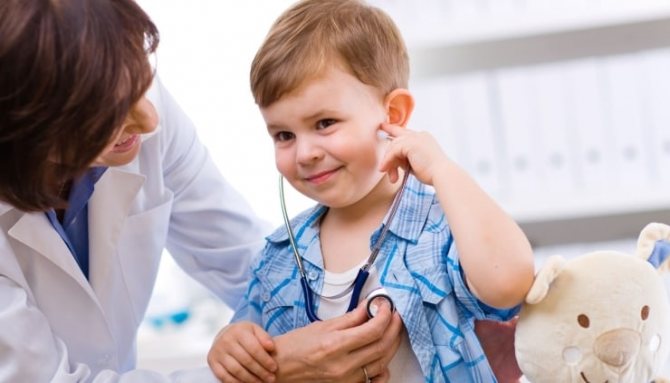
Importance of hepatitis vaccination per month
Hepatitis B is in the ranking of the most dangerous diseases common in the Russian Federation. That is why, in the very first hours of life, the child receives protection from it in the form of vaccination. Then immunity to hepatitis is further strengthened by vaccination every month.
According to the law, parents have the right to refuse vaccination, but it must be remembered that they are deliberately exposing their child to great risk. Hepatitis B is extremely difficult to treat and in most cases ends in complications - liver dysfunction occurs, cancer and other pathologies develop. There is a possibility that the disease will progress to a chronic stage. In this case, the person will live with many restrictions.
This is why doctors do not recommend refusing vaccination against hepatitis B, even in case of complications after the first vaccination. It is much safer to choose an analogue of a standard drug that is suitable for the characteristics of the body.
What diseases do vaccinations protect against?
From the table above you can already see what diseases vaccines are designed to protect children under one year of age. These are diseases such as polio, whooping cough, diphtheria, tetanus, etc.
It is especially worth mentioning vaccinations against such dangerous infections as viral hepatitis B, which is done in the first 24 hours of life, and tuberculosis (BCG vaccination) – on days 3–5 of life. In the future, vaccination against these serious diseases is repeated.
Recently, vaccination against hemophilus influenzae was added to the national vaccination calendar. Haemophilus influenzae can cause any disease in a child’s body, from a simple acute respiratory infection to meningitis and sepsis (blood poisoning), and at the same time it is very difficult to recognize.
Is it mandatory to vaccinate children under 1 year of age?
Children's doctors are almost unanimous that vaccinations according to the calendar are necessary if there are no absolute contraindications.
The risk of getting a severe infection at an older age and suffering from it with serious complications is incomparably greater than the risk of possible complications after vaccination in children under one year old.
Infections against which infants are vaccinated according to the national calendar, in previous years, in the absence of immunization, led to high mortality among children. Even today, the lives of children who have not received vaccinations according to the calendar are at risk of contracting infections such as diphtheria, hepatitis B, and encephalitis. And deadly tetanus lies in wait for any minor contamination of a harmless-looking skin wound or abrasion with soil.
Vaccination calendar – School of Dr. Komarovsky
Individual vaccination schedule
No matter how hard you try to strictly adhere to this calendar, your baby may still have his own individual vaccination schedule. Sometimes children get sick with colds or suffer from some kind of allergic manifestations.
In these cases, vaccination dates have to be postponed. It is well known that vaccination should not be carried out if the baby is sick, otherwise complications may arise. After illness you need to wait 3-4 weeks. The fact that children are vaccinated individually may also be affected by interruptions in the supply of vaccines to some medical institutions.
Deviations from the calendar are possible subject to a number of general rules: for example, you cannot vaccinate before the recommended date; BCG at two months of age is done only after the Mantoux test; it is necessary to strictly observe the time intervals between vaccinations, etc.
Contraindications to vaccination are divided into:
- True ones
are those listed in the instructions for the vaccines used, as well as in guidance documents (international recommendations and orders). Such contraindications are associated with certain components of vaccines; - False
- contraindications, the authorship of which belongs to the parents of young patients and some doctors. As a rule, such contraindications are formulated something like this: “he is so small, so sickly,” “if the family has had reactions to the vaccine, then he will too,” “since he gets sick often, it means his immunity is lowered,” etc.
Examples of true contraindications:
- If you have an allergic reaction to yeast dough, there may be contraindications to vaccination against hepatitis B, and if you are allergic to antibiotics - against rubella, polio and measles; if you are allergic to eggs - from influenza and measles;
- BCG vaccination is contraindicated in premature babies;
- For neurological diseases - convulsions, epilepsy, vaccination with the DTP vaccine, and specifically its pertussis component, is contraindicated;
- In case of severe immune disorders, cancer, severe forms of anemia, many vaccinations are contraindicated;
- Vaccinations cannot be given during the preoperative and postoperative period.
How to vaccinate correctly - what mothers need to know
[sc:ads]
Parents are most frightened by the possible consequences of vaccinations, among which there are very serious complications:
- Anaphylactic shock;
- Severe allergic reactions (Quincke's edema, Steven-Johnson syndrome);
- Poliomyelitis (after polio vaccination);
- Encephalitis, meningitis, neuritis and other central nervous system lesions;
- Generalized infection, osteitis, osteomyelitis after BCG vaccination;
- Chronic arthritis after rubella vaccine.
The likelihood of such complications, of course, frightens young parents. To reduce the risk of complications, vaccination must be carried out in compliance with all rules.
Basic Rules
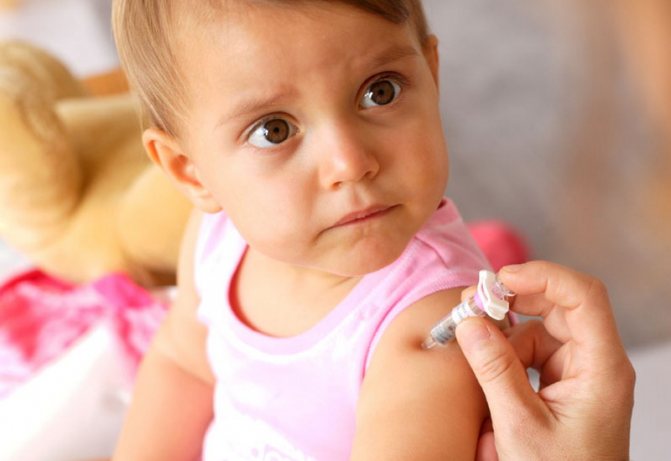
1. The vaccination schedule is the recommended vaccination schedule for your baby. It can be changed if there are reasons to delay or even cancel vaccination. The reason for temporary medical withdrawal may be:
- Malaise, cold, fever;
- Exacerbation of chronic diseases;
- Recent blood transfusion;
- Prematurity.
In each case, the duration of medical withdrawal is determined individually, usually a period from a week to 1 month. Indications for complete cancellation of vaccination are:
- Allergic reaction to a previous vaccination;
- Congenital or acquired immunodeficiency.
2. Vaccination can be given only after a thorough examination by a doctor. The doctor’s task is not only to thoroughly examine the child, measure the temperature and ask the mother about the characteristics of the baby’s body. Another important point is informing the mother about the vaccination itself. The doctor must tell you what vaccine will be given, how it works, what vaccine will be administered, and what complications are possible after vaccination. Good to know! – A reminder for mothers on how to communicate with a doctor.
3. The mother can choose which vaccine to give her child. At the clinic, all vaccinations are given free of charge, but if parents do not want to receive the vaccine purchased at the clinic, they can buy their own. This is usually done if they want to supply a higher quality imported vaccine or do a complex vaccination.
4. The vaccine can only be stored and transported in the cold, at a temperature of 2-8C. This rule applies, first of all, to the situation when the mother buys the vaccine herself, since in the pharmacy and clinic all storage and transportation rules are observed unconditionally. When purchasing a vaccine at a pharmacy, you need to buy a cold pack (“snowball”) for it and be sure to take a receipt. This may be needed at your pediatrician's office to confirm that the vaccine is fresh and has been stored correctly.
5. The vaccination itself is given to the child by a nurse in the treatment room. She enters all the information about the vaccination (date, name of the vaccine) into the card. After vaccination, the parents’ task is to monitor the baby’s condition and take action if the vaccination produces a reaction. The most common occurrence is an increase in temperature. Read about how to control the reaction of a child’s body and what to do if the temperature rises here (link).
Important: How to prepare a child for vaccination - rules, tips and recommendations
Restoring the vaccination schedule
In case of violations of standard vaccination periods, you can create your own individual vaccination schedule on the recommendation of an infectious disease specialist. The characteristics of vaccines and standard vaccination or emergency vaccination schedules are taken into account.
For hepatitis B, the standard regimen is 0-1-6. This means that after the first vaccination, the second follows a month later, followed by a revaccination six months later.
Vaccinations for children with immune diseases and HIV are performed exclusively with inactivated vaccines or recombinant drugs with the replacement of pathogenic proteins.
Features of vaccinations for adolescents
An amazing feature of the immune system is the protection of the human body from diseases by producing antibodies that resist the attack of viruses and microbes. Thanks to vaccination, confirmed by Louis Pasteur, humanity has managed to defeat many deadly diseases. Therefore, parents’ refusal to immunize teenagers can become a threat to the health of not only their own children, but also the entire population of the planet.
How to prepare for vaccination
- There is no need to pre-prepare a healthy child for vaccination, but it is important to know the start date of vaccination in advance.
- It would be a good idea to check your body temperature on the eve of the injection, regardless of what kind of vaccination you are receiving.
- If a 14-year-old student is prone to allergic reactions, he needs to take antihistamines two days before the vaccine is administered.
If the temperature is not elevated, there are no dyspeptic disorders or skin rashes, you can safely go for vaccination. In addition, the child should be warned to remain near the medical room for 20 minutes in case of emergency medical care.
DTP vaccination: difficulties of revaccination
This type of vaccine (tetanus, whooping cough and diphtheria) is considered the most difficult to tolerate. Since the preschooler has already received the initial vaccination, information about its consequences should be stored in the vaccination passport. If there are no complications, there is no cause for concern. After the injection, it is worth observing the teenager for two weeks while the risk of developing the following side effects remains:
- the appearance of a red rash all over the body;
- increased body temperature;
- leg pain, dyspepsia.
For you: Swollen vaccination: drugs and folk methods for eliminating a lump
The vaccination for 14-year-old children is given under the shoulder blade, so pain may be felt at the injection site. If a lump appears, it can be treated with Troxevasin ointment. It is forbidden to wash in hot water, rub or massage the lump under the shoulder blade.
Parents should know that the DPT vaccine does not provide 100 percent protection against diseases. The introduction of the vaccine guarantees the absence of complications and a mild course of the disease if a student becomes ill after contact with an infected person.
What are the results of revaccination against tuberculosis?
The anti-tuberculin test (Mantoux test), which should be done to adolescents at the age of 14, should not be considered a vaccination. Based on the reaction to the injection of serum, it is determined whether the child’s body is infected with Koch’s bacillus (microbacterium tuberculosis). Tuberculosis is a serious infectious disease that affects the respiratory system.
The vaccinating drug (tuberculin) is administered subcutaneously to 14 year old children. The health worker observes the child’s body’s reaction to the presence of the neutralized tuberculosis pathogen. Do not be afraid of the procedure; infection with Koch’s wand during vaccination is excluded. Parents of a 14-year-old schoolchild need to know the rules for caring for Mantoux vaccination:
- The injection site should not be wet for two days;
- It is forbidden to treat the wound with antiseptics or apply a band-aid;
- Within two days you should stop eating allergenic foods.
However, you should not refuse the tuberculin test. The procedure is considered the most accurate method indicating the presence of the causative agent of a deadly disease in the body. If a pronounced immune response to the Mantoux reaction appears, the child needs additional examination.
Vaccination that protects against polio
The result of polio is the development of spinal paralysis. There are no medications to treat a dangerous viral disease, even in a hospital setting. Therefore, doctors call preventive vaccination the only protection against infection and spread of the virus.
Receiving the vaccine by 14-year-old schoolchildren is the third stage of revaccination against a disease that threatens many complications. The inactivated vaccine is administered orally to the child's body. Four drops of a pink solution with a specific taste are dripped under the tongue or onto the tonsil area, which prevents spitting out the liquid.
It is important to warn the teenager that after vaccination against polio, you should not take liquid or food for an hour. The vaccination solution should be absorbed at the injection site without contact with gastric juice.
Why do you need to have mandatory vaccinations based on age?
An unvaccinated child who is constantly among vaccinated children most likely will not get sick precisely because of herd immunity. The virus simply does not have enough carriers to spread and further epidemiological infection. But is it really ethical to use the immunity of other children to protect your own child? Yes, your child will not be pricked with a medical needle, he will not experience discomfort after vaccination, fever, weakness, and will not whine and cry, unlike other children after vaccination. But when in contact with unvaccinated children, for example, from countries without mandatory vaccination, it is the unvaccinated child who is at maximum risk and may get sick.
The immune system does not become stronger by developing “naturally” and infant mortality rates are clear confirmation of this fact. Modern medicine cannot counteract viruses with absolutely nothing except prevention and vaccinations, which build the body’s resistance to infection and disease. Only the symptoms and consequences of viral diseases are treated.
In general, only vaccination is effective against viruses. Keep up with your age-appropriate vaccinations to keep your family healthy. Vaccination of adults is also desirable, especially with an active lifestyle and contact with people.
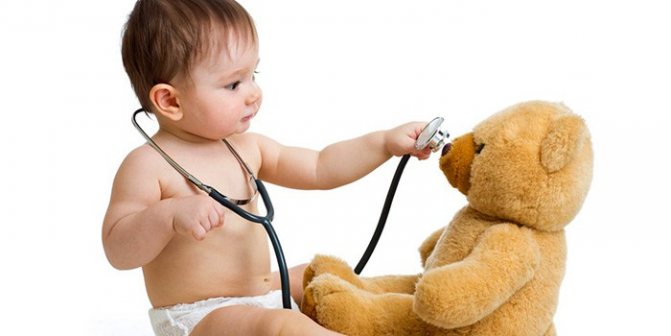
How should children be vaccinated?
To avoid complications after vaccination, children must be carefully prepared:
- Blood and urine tests are required.
- Get advice from a neurologist, allergist and therapist, who will give professional opinions on the possibility of vaccinating your child.
- Immediately on the day of vaccination, children need to have their temperature measured. If there is the slightest hesitation, the vaccination should be postponed to another, more favorable day.
Every parent should carefully monitor the quality of the vaccine that is given to their child. If there is such a possibility, then you need to find out under what conditions ampoules with antigens are stored. In the specialist’s office, you should find out what the expiration date is for the vaccination that he is going to give to the child.
If there are any doubts about the quality of the vaccine or the professionalism of the medical staff, parents should refuse vaccination and choose a more reliable medical facility.
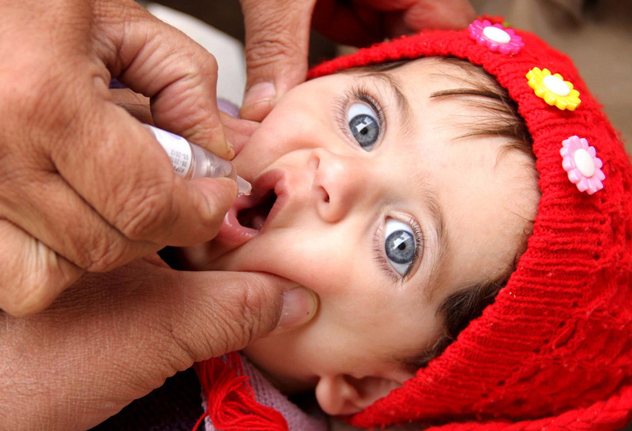
After vaccination, the following rules must be observed:
- There is no need to leave the medical facility immediately after vaccination. It is advisable to be in close proximity to the therapist’s office for 30-60 minutes, who will be able to provide qualified assistance in case of any problems.
- After vaccination, you should not wet the area where the injection was given.
- If the DPT vaccination was given in the summer, parents need to carefully monitor the child’s temperature. If it increases slightly, then the baby should be given an antipyretic drug, which was recommended by the local physician. It is important to remember that children under 5 years old should not be given Aspirin. If the temperature rises rapidly, you need to seek help from the nearest medical facility or call an ambulance.
- The usual diet of children can be changed only one day after vaccination.
- If, after vaccination, the behavior of children causes anxiety among parents, they urgently need to get advice from specialists.
What is revaccination?
Revaccination is the repeated administration of a vaccine to maintain the level of antibodies to a disease in the blood and to strengthen the immune system. Typically, revaccination is easy and without any special reactions from the body. The only thing that may worry you is microtrauma at the site of vaccine administration. Together with the active substance of the vaccine, about 0.5 ml of an adsorbent substance is injected, which holds the vaccine inside the muscle. Unpleasant sensations from microtrauma are possible throughout the week.
The need to introduce an additional substance is due to the effect of most vaccines. It is necessary that the active components enter the blood gradually and evenly over a long period of time. This is necessary for the formation of correct and stable immunity. A slight bruise, hematoma, or swelling is possible at the site of vaccine administration. This is normal for any intramuscular injections.
Vaccination methods
Vaccination of children, in accordance with Russian legislation, is carried out both for the purpose of prevention and treatment of diseases. Today, many parents are categorically against vaccinations, as they believe that they can harm their babies. When deciding to refuse routine vaccination, you need to be aware of all the consequences and problems that you may encounter.
Vaccination of children in Russia can be carried out in several ways, depending on the type of vaccination. The most common method of administration is intramuscular , which allows you to achieve maximum effect.
Antigens introduced in this way quickly spread through the bloodstream, and children quickly begin to develop immunity to a specific disease.
Preoral administration of the vaccine involves the introduction of an infection of enterovirus origin (poliomyelitis). The subcutaneous method of vaccinating a child is advisable only for live vaccines, fever (yellow), mumps, rubella, measles, etc. The cutaneous and intradermal method of vaccination is carried out with the introduction of a dry tularemia vaccine and the following antigens: BCG, bacillus Calmette-Guerin, smallpox.
There is another method of vaccinating children in Russia, which does not lead to the development of stable immunity to diseases. The intranasal method of vaccination (through the nose) involves the use of vaccinations made on the basis of ointments, creams, aerosols and aqueous solutions.
Such vaccination allows for a short period of time to create a barrier to harmful microorganisms that enter the body of children through airborne droplets (rubella, measles, influenza).
How is immunity formed?
The formation of natural immunity occurs as a result of a viral disease and the production of appropriate antibodies in the body that contribute to resistance to infection. Immunity is not always developed after a single illness. Developing lasting immunity may require repeated illness or a successive round of vaccinations. After an illness, the immune system can be greatly weakened and various complications arise, often more dangerous than the disease itself. Most often these are pneumonia, meningitis, otitis, for the treatment of which strong antibiotics must be used.
Infants are protected by maternal immunity, receiving antibodies through breast milk. It does not matter whether maternal immunity is developed through vaccinations or has a “natural” basis. But against the most dangerous diseases, which form the basis of child and infant mortality, early vaccination is necessary. Hib infection, whooping cough, hepatitis B, diphtheria, tetanus should be excluded from the dangers to a child’s life in the first year of life. Vaccinations form complete immunity against most infections that are fatal to an infant without illness.
Creating the “natural” immunity advocated by environmentalists takes too long and can be life-threatening. Vaccination promotes the safest formation of full immunity.
The vaccination calendar is formed taking into account age requirements and the characteristics of the vaccines. It is advisable to adhere to the medically prescribed time intervals between vaccinations for the full formation of immunity.
How to refuse vaccination
The vaccinations specified in the order of the Ministry of Health of the Russian Federation dated March 21, 2014 No. 125n are given to all children. However, parents have the right to refuse one or all vaccines by writing a corresponding statement. It is issued in the name of the head physician of the medical institution where the child is being observed.
There is no single form for an application to refuse vaccination. However, it is recommended to adhere to the following structure.
- A cap that indicates the name of the head physician and the name of the medical institution.
- Designation of the topic of the application (refusal to vaccinate a child against hepatitis B until he reaches 15 years of age).
- Link to the legal provisions in accordance with which the refusal is carried out:
- Art. 5 (on the right to refuse vaccination) and Art. 11 (on vaccination with the consent of the parents of minors) of the Federal Law of the Russian Federation “On Immunoprophylaxis of Infectious Diseases” dated September 17, 1998 No. 157-FZ;
- Art. 32 (on consent to medical intervention) and Art. 33 (on the right to refuse medical intervention) “Fundamentals of the legislation of the Russian Federation on the protection of the health of citizens” dated July 22, 1993 No. 5487-1.
- Request to issue Form 063 for the child, indicating the absence of appropriate vaccinations on the basis of Articles 5 and 11 of the Law of the Russian Federation “On Immunoprophylaxis of Infectious Diseases”.
- Signature and date of writing the application.
If the medical staff refuses to accept the application, a copy of it and the parents’ complaint are sent to law enforcement agencies.
To vaccinate children or not to vaccinate them?
The question of the advisability of vaccinating children has become acute in recent decades: in Russia and around the world, the so-called anti-vaccination movement remains popular, whose supporters consider vaccination a harmful procedure imposed by pharmacological corporations for the purpose of enrichment.
This point of view is based on isolated cases of complications or death of children who were vaccinated against any infections. In most cases, it is not possible to establish an objective cause for such a tragedy, but opponents of vaccinations do not consider it necessary to rely on statistics and facts; they appeal only to the natural feeling of fear of parents for their children.
The danger of such beliefs is that without universal vaccination it is impossible to exclude the persistence of foci of infection, the carriers of which are unvaccinated children. By coming into contact with other babies who have not received the vaccine due to contraindications, they contribute to the spread of the disease. And the more convinced “anti-vaxxers” there are among parents, the more often children suffer from measles, meningitis, rubella and other infections.
Another reason that often deters parents from vaccination is the uncomfortable conditions in the vaccination room of the children's clinic at their place of registration. However, proper planning of time, an experienced doctor who will explain all the questions, and your positive attitude, which will be reflected in the child, will certainly help you survive the vaccination without tears and disappointments.
In Russia, it is possible to refuse vaccination; for this you need to sign the appropriate documents. No one will be interested in the reasons for refusal and force children to be vaccinated. There may be legal restrictions on refusals. There are a number of professions for which vaccinations are mandatory and refusal to vaccinate may be considered as unsuitability. Teachers, employees of children's institutions, doctors and livestock breeders, veterinarians must be vaccinated to avoid becoming a source of infection.
You also cannot refuse vaccinations during epidemics or when visiting areas declared a disaster zone due to an epidemic. The list of diseases in the event of epidemics of which vaccination or even urgent vaccination is carried out without a person’s consent is enshrined in law. First of all, these are natural or black smallpox and tuberculosis. In the 80s of the 20th century, smallpox vaccination was excluded from the list of mandatory vaccinations for children. The complete disappearance of the pathogen and the absence of foci of infection were assumed. However, in Siberia and China, since the refusal of vaccination, at least 3 focal outbreaks of the disease have occurred. It may make sense to get vaccinated against smallpox in a private clinic. Smallpox vaccines must be ordered separately. Vaccination against black pox is mandatory for livestock farmers.
How is immunization tolerated?
Healthy children, if they follow all the rules for preparing for vaccination and administering an injection, tolerate vaccination in most cases well. Different antigenic materials have their own degree of reactogenicity. The hepatitis B vaccine is well accepted by the child's body.
If adverse reactions occur during vaccination, they are mild and disappear after a short time; they usually manifest themselves as follows:

- increased body temperature;
- swelling and pain at the injection site;
- abscess;
- convulsions;
- prolonged crying;
- loss of appetite;
- stool disorder;
- bad dream.
Some parents are afraid of developing adverse reactions from vaccinations, so they refuse immunization. Pediatrician Komarovsky categorically does not recommend doing this. The doctor notes that today high-quality, highly purified drugs are used to vaccinate children. Therefore, the likelihood of developing complications from vaccinations is minimal.
The consequences of contracting a viral or infectious disease are much more dangerous than poor tolerance of the vaccine. Before the introduction of antigenic material, the child is examined and prepared in a certain way. Therefore, all parents’ fears are in vain.
Post-vaccination complications occur in 2% of the total number of vaccinated people.
From 2020, two more vaccinations will become mandatory in Russia
The Ministry of Health will include two vaccinations in the national calendar - against chickenpox and rotavirus infection; they will become mandatory from 2020 . Minister of Health Veronika Skvortsova announced this:
“Starting from 2020, the national vaccination calendar is expanding to two vaccinations: against chickenpox and rotavirus infection . Meningococcal infection is also now being vaccinated within the framework of epidemic calendars, for which the constituent entities of the Russian Federation are responsible. But we are observing the situation and, perhaps, we will consider the issue of transferring this vaccine to the national level.”
Also about the planned innovations in the National Vaccination Calendar, Deputy Health Care of the Russian Federation Sergei Kraevoy spoke:
«As part of the “Decade of Childhood,” which was announced by the president of our country, the action plan sets the task of including vaccination against rotavirus infection and chickenpox in the national calendar of preventive vaccinations from 2020.”
The Deputy Minister also noted that it would not be possible to include vaccination in the calendar before 2020 due to the sufficient supply of domestic vaccines against these diseases.
“It is planned that vaccination will be done at the expense of the federal budget, that is, free of charge”
, he said.
For information:
Rotavirus infection is an acute disease, belonging to the viral group, characterized by the development of a general intoxication syndrome together with disruption of the proper functioning of the intestinal tract and the appearance, as a rule, of gastroenteritis. Rotavirus infection is the most common cause of diarrhea in children under 5 years of age. If not treated correctly, rotavirus can cause complications, including death. According to WHO recommendations, vaccination against rotavirus should be carried out when the child reaches 6 weeks. Note that the cost of a vaccine against rotavirus infection starts from 1260 rubles.
Chicken pox (chickenpox) is an acute infectious disease with airborne transmission, mainly in childhood, characterized by fever, as well as a rash on the skin and mucous membranes in the form of small blisters with transparent contents. In people with weakened immune systems, complications from chickenpox can be in the form of: streptoderma, abscess, boils, chickenpox arthritis, pneumonia, encephalitis, meningitis, polyneuritis, etc.
Regarding vaccination, WHO recommends that all children aged 12-18 months be vaccinated against chickenpox. In the United States, the vaccine is being reintroduced to children aged 4-5 years. Vaccination is also recommended for all older children who have not had chickenpox.
Note that the cost of vaccination against chickenpox varies from 2500 to 4500 rubles.
Why is hepatitis B dangerous? Why is vaccination necessary?
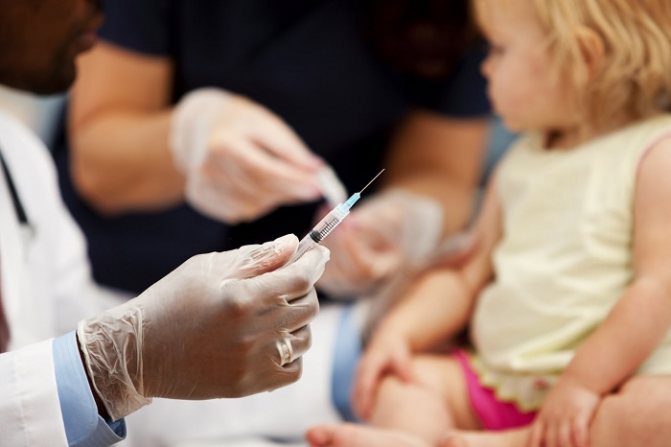
Hepatitis B is a viral disease that affects liver cells and usually occurs in acute or chronic form.
The infection is transmitted in the following ways:
- From the mother during childbirth.
- During blood transfusion.
- During medical procedures through an infected needle.
- In a dental office or beauty salon due to the use of insufficiently sterilized instruments.
In most cases, it is impossible to find out the cause of the disease.
Signs of the disease in the early stages resemble acute respiratory infections or the flu. Then yellowing of the sclera, skin, pain and discomfort in the hypochondrium in the liver area, general malaise, weakness, vomiting, darkening of urine and discoloration of feces may occur.
When taking laboratory tests, an increase in bilirubin levels and the presence of enzymes synthesized by the liver are noted.
In babies under one year of age, hepatitis B occurs without visible signs. Lack of timely diagnosis can provoke the development of cirrhosis and malignant neoplasms in the liver.
The hepatitis B vaccine reduces the risk of transmission of the virus, helps develop immunity to the disease and is included in the vaccination schedule recommended by WHO.
The hepatitis B vaccine includes the following components:
- Antigen or fragments of the viral envelope. The human body accepts these molecules as foreign and therefore produces antibodies to them. This is how immunity to the disease is formed.
- Preservative – thiomersal.
- Adjuvant – aluminum hydroxide. This substance can activate the production of antibodies.
Both imported and domestic vaccines are used for vaccination: Infanrix Hexa and Engerix B, produced in Belgium, Shanvak B, from India, as well as DPT Hep B, produced in Russia.
Problems that may arise if children do not have routine vaccinations
Today, for many parents, the issue of childhood vaccination is an urgent one. Many people do not know whether or not to get mandatory vaccinations. This is due to the fact that the number of children who have complications after routine vaccinations increases every year.
As a result, more and more families are deciding not to vaccinate their children. By deliberately taking such a risk, they may encounter problems when registering their children for kindergarten or school, or when traveling to sanatoriums or summer camps.
The legislation in force in the Russian Federation does not force children to undergo mandatory vaccination. Only their parents have the right to decide this issue. If a family decides not to vaccinate their child, they may only encounter temporary difficulties when enrolling him in a kindergarten or educational institution.
The Directorate has no legal grounds to refuse admission to unvaccinated children. Parents can receive a temporary refusal only if, at the time of registration of documents, there is a mass illness of children (infectious or viral) in the institution.
In practice, the management of schools and kindergartens usually tries in every possible way to prevent such children from joining the group, since they pose a “threat” of epidemics and outbreaks of serious diseases. Managers either do not accept medical cards without notes on scheduled vaccinations at all, or they blame their reluctance to register a child who did not participate in vaccination by the lack of available places.
The Sanitary and Epidemiological Station closely monitors that children without vaccinations are not admitted to preschool institutions. It is also worth noting that in Russia, during a mandatory medical examination before a kindergarten or school, health care workers may refuse to sign the card of a child who has not received routine vaccinations.
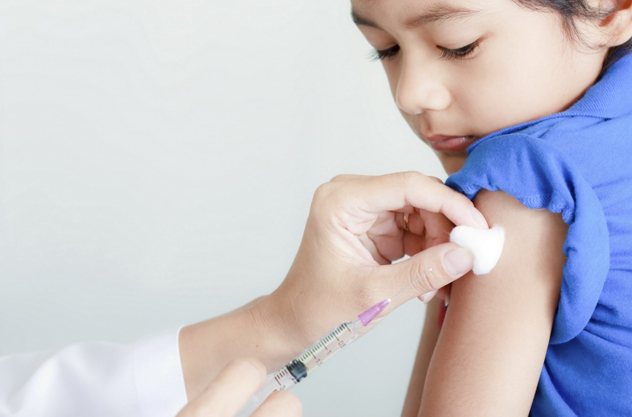
If parents still want to exercise their constitutional right to freedom to decide whether to vaccinate their children, they can do the following:
- Write a statement to the head physician of a medical institution whose employee refuses to sign the child’s medical record.
- If the management of the clinic refuses to resolve the issue peacefully, parents should submit an application to the prosecutor's office.
- At the same time, it is recommended to write a complaint to the local Health Department.
- In the event that children do not want to be admitted to a kindergarten or school, parents need to submit a request to the institution, demanding to indicate the reason for the refusal. Management is obliged to respond to such a request and respond in writing. If they refer to the lack of vacancies, then after such a response, other children can be admitted to the institution only after notifying the parents of the unvaccinated child about the vacancy. They are also advised to write a complaint to the directorate of the kindergarten or school, and to the education department.
When planning vacations and recreational activities in Russia and abroad, parents of unvaccinated children need to remember that in sanatoriums and summer camps it is necessary to issue certificates of epidemic welfare and vaccination certificates.
Author: Savenko Ilona
More information about vaccinations for hesitant parents
We recommend reading: Treating coughs and runny nose with inhalations
I like!


